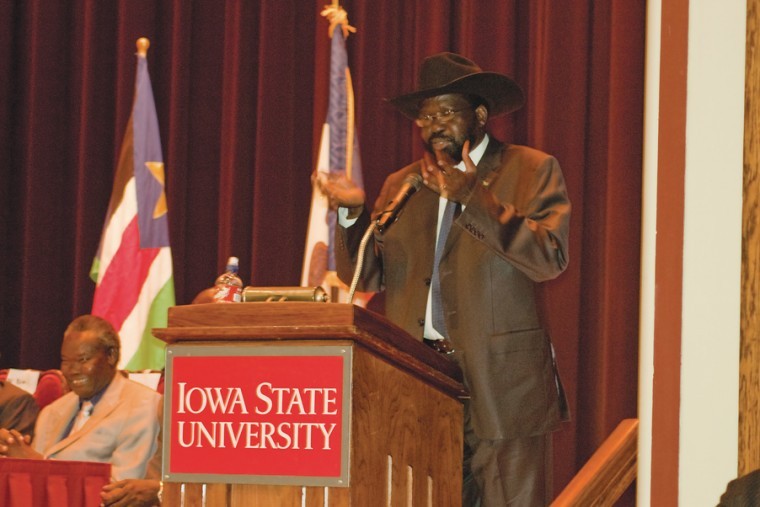Sudanese president speaks to refugees on unifying country
President of the Government of Southern Sudan General Salva Kiir Mayardit speaks Sept. 19, 2010 in the Great Hall of the Memorial Union.
September 20, 2010
The president of the Government of Southern Sudan, General Salva Kiir Mayardit, said the referendum on whether to unify or separate Northern and Southern Sudan is a crucial step in maintaining peace in the troubled region.
To an audience of hundreds of Sudanese refugees from around the Midwest, the president explained that the referendum, which is scheduled for Jan. 9, must include all Southern Sudanese, including those living in Northern Sudan.
“It was not your choice to come here, but you were forced to flee your own country to come as refugees,” Kiir said. “We thank the United States of America and their people for sheltering our refugees, those who ran away from war. Those who came with the determination have graduated from the universities with different qualifications. But what do they do? I want to assure you that you will go back to your country once we finish all of these problems.”
Kiir led an interim government that resulted from efforts of the Sudanese People’s Liberation Movement, which fought for the establishment of a democratic Sudanese government. SPLM ended its war with the government in 2005. Kiir said 3 million Southern Sudanese people died during the conflicts in the country that lasted 22 years.
He was elected president of Southern Sudan in a democratic election in April. As vice president he had been thrust into the role of president in 2005 when former President John Garang died in a plane crash.
“We started from scratch,” Kiir said. “Nothing was there, but our system is now functioning.”
Yet he admitted the Southern Sudanese government is still plagued with difficult challenges. The North and South still disagree about the borders dividing the two areas. He also said the two factions have yet to fully comply with all parts of the Comprehensive Peace Agreement, which was signed in 2005.
The agreement called for the North and South to enter into power- and wealth-sharing strategies that would benefit both regions equally.
Unfortunately, he said, this has not come to fruition in the years since its signing. He said the South shares 50 percent of its oil profits with the North, but the relationship is not reciprocal.
Since the signing of the agreement, the South has struggled to rebuild an infrastructure that was totally destroyed by war.
“Six years are not enough, but we work day and night to restore confidence in the people that has been lost during the war,” Kiir said.
He encouraged audience members to talk to their fellow countrymen about the importance of voting for separation from Northern Sudan. Although unifying with the North is an option for voters, he said people should see the value of separation because a choice exists.
Humanists will encourage unity while separatists will encourage secession, he said. Yet he said unity has not been made attractive to Southern Sudanese.
“The unity is looking very ugly,” he said.
He addressed criticism that the Southern Sudanese government is corrupt, negligent or without a democratic mandate to rule. Southern Sudan’s foes, he said, are behind the rumors and are now conspiring to ruin the democratic progress underway in the country.
These forces “trying to disturb the South” have delayed the South’s efforts to rebuild and fully enact the Comprehensive Peace Agreement, he said.
“The referendum is not for me alone,” Kiir said. “It is not mine. It is ours. Tomorrow if you vote for unity, I will not be angry because I have done my job. If Southern Sudanese people vote for unity, I will not be angry. But the people who voted for unity, the consequences will be for you.”
He said the international and Sudanese communities should “accept, respect and protect these [referendum] results and then recognize Southern Sudan as an independent state.”
Iowa State has a long relationship with the Southern Sudanese government. Garang, the first president of Southern Sudan, graduated with a master’s degree in agricultural economics and doctorate in economics. Kiir said he wants Iowa State to continue educating Sudanese students who will take their acquired knowledge and return to help the citizens of Southern Sudan, a sentiment echoed by several Sudanese officials who spoke before the president.
The South Sudanese Student Association was instrumental in arranging Kiir’s visit along with the Committee on Lectures.







